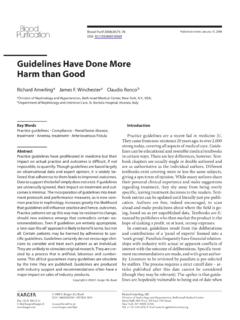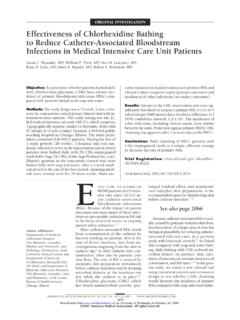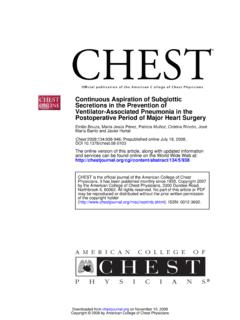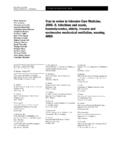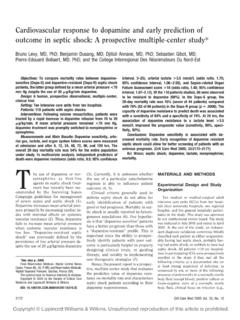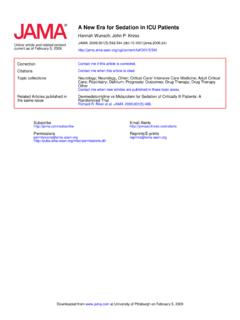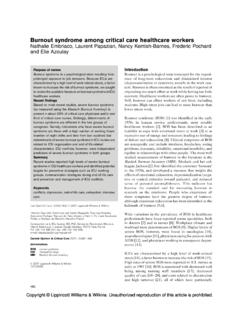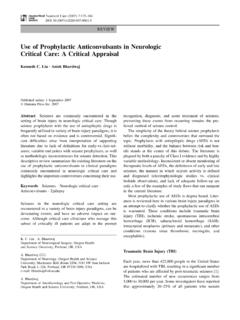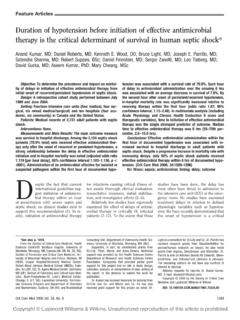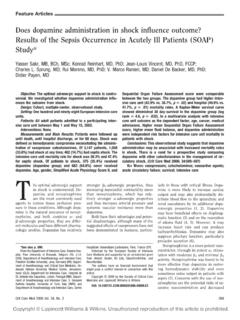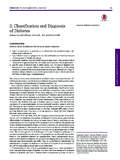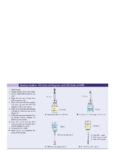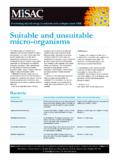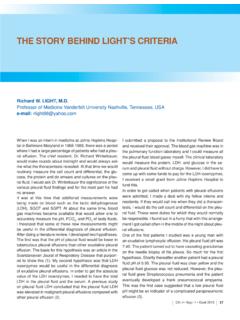Transcription of Intensive Intraoperative Insulin Therapy versus ...
1 Intensive Intraoperative Insulin Therapy versus Conventional GlucoseManagement during Cardiac SurgeryA Randomized TrialGunjan Y. Gandhi, MD, MSc; Gregory A. Nuttall, MD; Martin D. Abel, MD; Charles J. Mullany, MD; Hartzell V. Schaff, MD;Peter C. O Brien, PhD; Matthew G. Johnson, MPH; Arthur R. Williams, PhD; Susanne M. Cutshall, RN; Lisa M. Mundy, RN;Robert A. Rizza, MD; and M. Molly McMahon, MDBackground:It is not known whether rigorous Intraoperative gly-cemic control reduces death and morbidity in cardiac surgery :To compare outcomes of Intensive Insulin Therapy dur-ing cardiac surgery with those of conventional Intraoperative glu-cose :A randomized, open-label, controlled trial with blinded endpoint :Tertiary care :Adults with and without diabetes who were undergoingon-pump cardiac :The primary outcome was a composite of death,sternal infections, prolonged ventilation, cardiac arrhythmias, stroke,and renal failure within 30 days after surgery.
2 Secondary outcomemeasures were length of stay in the Intensive care unit and :Patients were randomly assigned to receive continu-ous Insulin infusion to maintain Intraoperative glucose levels be-tween (80 mg/dL) and mmol/L (100 mg/dL) (n 199) orconventional treatment (n 201). Patients in the conventionaltreatment group were not given Insulin during surgery unless glu-cose levels were greater than mmol/L ( 200 mg/dL). Bothgroups were treated with Insulin infusion to maintain normoglyce-mia after :Mean glucose concentrations were statistically significantlylower in the Intensive treatment group at the end of surgery ( [SD, ] [114 mg/dL {SD, 29}] in the Intensive treatmentgroup vs. mmol/L [SD, ] [157 mg/dL {SD, 42}] in theconventional treatment group; difference, mmol/L [95% CI, to mmol/L] [ 43 mg/dL {CI, 50 to 35 mg/dL}]).Eighty two of 185 patients (44%) in the Intensive treatment groupand 86 of 186 patients (46%) in the conventional treatment grouphad an event (risk ratio, [CI, to ]).
3 More deaths (4deaths vs. 0 deaths;P ) and strokes (8 strokes vs. 1 strokes;P ) occurred in the Intensive treatment group. Length ofstay in the Intensive care unit (mean, 2 days [SD, 2] vs. 2 days [SD,3]; difference, 0 days [CI, 1 to 1 days]) and in the hospital (mean,8 days [SD, 4] vs. 8 days [SD, 5]; difference, 0 days [CI, 1to0days]) was similar for both :This single-center study used a composite end pointand could not examine whether outcomes differed by : Intensive Insulin Therapy during cardiac surgery doesnot reduce perioperative death or morbidity. The increased inci-dence of death and stroke in the Intensive treatment group raisesconcern about routine implementation of this Intern ;146 author affiliations, see end of registration number: occurs frequently in patients with andwithout diabetes during cardiac surgery, especiallyduring cardiopulmonary bypass surgery (1, 2).
4 In a studyby Van den Berghe and colleagues (3), Intensive insulintherapy after surgery reduced morbidity and death in crit-ically ill patients, most of whom underwent cardiac sur-gery. As a result, professional organizations have recom-mended rigorous glycemic control in hospitalized patients(4) and strict glycemic control is now routine practice dur-ing the postoperative period in cardiac surgical , no consensus exists on the optimal manage-ment of Intraoperative hyperglycemia in cardiac surgicalpatients because of the lack of evidence from randomizedtrials. Researchers are increasingly extrapolating evidencefrom studies that assess the role of strict postoperative gly-cemic control in critically ill patients to advocate for intra-venous Insulin Therapy for patients in the operating room(3, 5 7). Evidence, strictly from observational studies, sug-gests that tight Intraoperative glycemic control may reducepostoperative complications (8 10).
5 We recently reported,in a retrospective, observational study of 409 cardiac sur-gical patients, that Intraoperative hyperglycemia was an in-dependent risk factor for perioperative complications, in-cluding death, after adjustment for postoperative glucoseconcentrations. Each (20 mg/dL) increase inglucose concentration greater than mmol/L ( 100 mg/dL) during surgery was associated with a 34% increase inthe likelihood of postoperative complications (8).An association between Intraoperative hyperglycemiaSee also:PrintEditors TablesCME quizConversion of figures and tables into slidesAnnals of Internal MedicineArticle 2007 American College of Physicians233and adverse outcomes based on observational studies doesnot prove causality. Because hyperglycemia can adverselyaffect immunity, wound healing, and vascular function,the concept that normoglycemia be maintained during therelatively brief duration of cardiac surgery seems plausible(11 16).
6 On the other hand, the degree of intraoperativehyperglycemia may merely reflect the severity of underly-ing stress. If so, prevention of hyperglycemia might notreduce perioperative complications, and the risks and costsof Intensive Intraoperative glycemic management may out-weigh the benefits. Simple, safe, and effective Insulin infu-sion algorithms that achieve rigorous Intraoperative glyce-mic control are lacking. To address these questions, weconducted a randomized, controlled trial at 1 center todetermine whether maintenance of near normoglycemiaduring cardiac surgery by using Intraoperative intravenousinsulin infusion reduced perioperative death and morbiditywhen added to rigorous postoperative glycemic OverviewThis was a randomized, open-label, controlled trialwith blinded assessment. We randomly assigned patients toreceive Intensive Insulin Therapy to maintain intraoperativeglucose levels between (80 mg/dL) and mmol/L(100 mg/dL) or conventional treatment.
7 By design, bothgroups were postoperatively treated with strict glycemiccontrol to ensure that the observed difference in outcomecould be attributed to the effects of Intraoperative performed the study at St. Marys Hospital, Roch-ester, Minnesota, which is a tertiary care teaching hospitalwith 1157 beds and an average of more than 41 000 ad-missions per undergoing elective cardiac surgery betweenJuly 2004 and April 2005 were eligible for enrollment inour study. We excluded patients who had off-pump car-diopulmonary bypass procedures. The Mayo FoundationInstitutional Review Board, Rochester, Minnesota, ap-proved the and InterventionsBefore we enrolled patients in our randomized trial,we enrolled 20 patients in a 2-week pilot trial to ensurethat the anesthesiologists in the operating room and thenursing staff in the Intensive care units (ICUs) had ade-quate experience with the study Insulin infusion 20 patients received Intensive Insulin Therapy duringsurgery and for 24 hours after surgery.
8 The pilot perioddata allowed us to modify the graded Insulin infusion toachieve desired glucose concentration goals. We built safetyfeatures into our infusion protocol to minimize hypoglyce-mia. We discontinued the infusion when glucose levelswere less than mmol/L ( 80 mg/dL) and initiateddextrose infusion. When glucose levels decreased to lessthan mmol/L ( 60 mg/dL), we treated hypoglycemiaaccording to a standardized hypoglycemia protocol. Perprotocol, patients treated in the pilot phase were not in-cluded in the analyzed coordinators obtained written informed consentfrom all patients who met eligibility criteria. We randomlyassigned patients to receive Intensive or conventional intra-operative Insulin Therapy . Randomization was computer-generated with permuted blocks of 4, with stratificationaccording to surgeon, surgical procedure (coronary arterybypass grafting [CABG] with or without other proceduresand no CABG), and diabetes.
9 The randomization assign-ments were concealed in opaque, sealed, tamper-proof en-velopes that were opened sequentially by study personnelafter participants signed the patient consent form. Wecould not possibly know, before obtaining consent, the fewpatients who would not have Intraoperative hyperglycemia( glucose concentration of mmol/L or more [ 100 mg/dL]). Therefore, per protocol, patients who gave consentwere randomly assigned, and those whose glucose levelswere less than mmol/L ( 100 mg/dL) during surgerywere not included in the final PeriodIntensive TreatmentPatients in the Intensive treatment group received acontinuous intravenous Insulin infusion, 250 units of No-voLin R (Novo Nordisk, Princeton, New Jersey) in 250mL of sodium chloride, when their blood glucoselevels exceeded mmol/L ( 100 mg/dL). We adjustedContextIntensive Insulin Therapy used to maintain normoglycemiaduring Intensive care after cardiac surgery improves peri-operative outcomes.
10 Its effect during cardiac surgery authors randomly assigned 400 cardiac surgical pa-tients to tight glycemic control ( blood glucose level, mmol/L [80 to 100 mg/dL]) during surgery or usualintraoperative care. All patients received tight glycemiccontrol in the cardiac Intensive care unit. The groups hadthe same risk for perioperative adverse events (risk ratio, [95% CI, to ]). The Intensive treatment grouphad more strokes (8 ) and more deaths (4 vs. 0) thanthe conventional treatment authors performed the study at a single normoglycemia during cardiac surgery doesnot improve outcomes and might worsen them. The EditorsArticleIntensive Intraoperative Insulin Therapy in Cardiac Surgery23420 February 2007 Annals of Internal MedicineVolume 146 Number infusions to maintain blood glucose levels between (80 mg/dL) and mmol/L (100 mg/dL). We adjustedthe dose according to a standardized algorithm used byanesthesiologists (Appendix Table 1, available at ).
